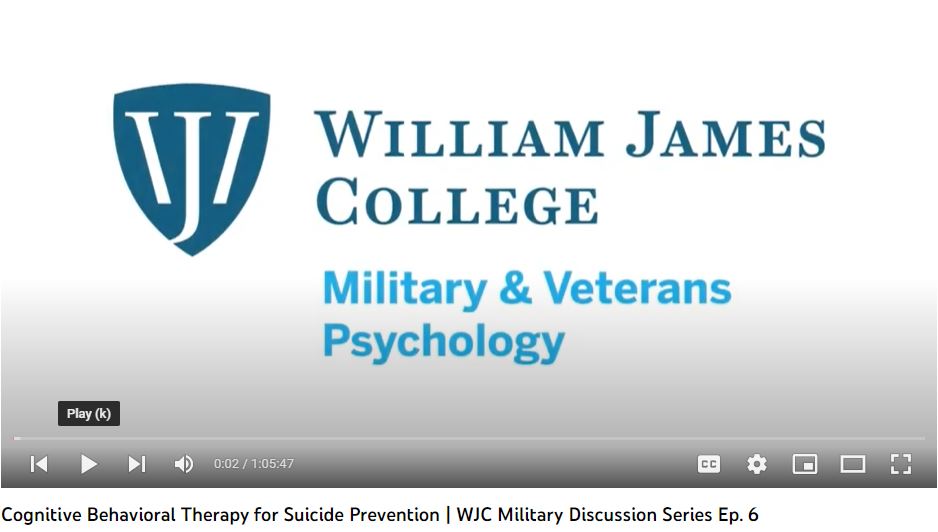Military and Veterans Psychology Program Lecture Series Reaches Thousands Across the Country, Aims to Reach More Through Publicly Available Recordings

Recordings of lectures presented in a ten-part series by the military and veterans program are available on YouTube.
A ten-part lecture series presented over the past year by the Military and Veterans Psychology Program provided continuing education opportunities to over 1,000 mental health professionals – some of whom already had experience working with military and veteran populations, and some who were seeking this information for the first time.
“The goal was to bring attention to specific issues relevant to the mental health of military, veterans, and their families throughout the community – and to offer some referral options as well,” explained Dr. Jenny D’Olympia, Director of the Military and Veterans Psychology (MVP) and Train Vets to Treat Vets® (TVTV) concentration. D’Olympia is also Assistant Professor and Assistant Chair of the Counseling and Behavioral Health Department and Director of the Master of Arts in Psychology (online) Program.
The series built on the success of events offered last year, with this year’s lectures available for continuing education credit for the first time. Participant, lecturer, Retired Army Colonel Corey New, said the continuing education series offered different insights and perspectives that resonated and helped him personally, as a veteran. New is a graduate of the College’s Graduate Certificate in Executive Coaching program and an experiential program leader.
“We delivered 10 one-hour lectures, making 10 hours of continuing education training available to providers. Combined, we had over 1,000 participants from all over the country,” said D’Olympia. Popular topics included “Cognitive Behavioral Therapy for Suicide Prevention,” which was presented by a guest speaker from the VA, and “Moral Injury.”
The sessions, D’Olympia said, took a unique approach to involving students both in the development and the presentation of the material.
“We included clinical and related personal experiences throughout several of our lectures. In one example the presentation on the principles of moral injury and treatment included a discussion between a licensed provider and a student, Kevin Lambert, who discussed his own personal experiences related to moral injury, throughout,” said D’Olympia.
Lambert, a student in the Bachelor of Science in Psychology and Human Services program is a member of the TVTV program and a TVTV program development assistant. He served in the Army for three years, including spending 16 months on deployment to Iraq.
Inviting students to present had several additional benefits. Beyond providing compelling content and expertise, students also helped develop the sessions and, through their participation, learned how to create a continuing education program and gained a new skill to include in their professional portfolio.
“It was exciting to have a hands on experience that allowed me to feel immediately involved in the William James learning community,” said Kelly Ré, a first-year student, MVP/TVTV program assistant, and Health Professions Scholarship Program (HPSP) scholarship recipient.
Dr. Angela Taveira-Dick, Project Director for the Graduate Psychology Education and Opioid Workforce Expansion Training Grants program and training program development coordinator, presented a lecture on “The Benefits of Peer Support” and attended several sessions as a participant.
“[Peer support] is an intervention that is effective and has experienced a lot of growth as an innovative community intervention for veterans,” she said. “As both a presenter and attendee for this series, I felt that the topics offered through the series were both informative and timely. [The series] also offered me the exciting opportunity to connect with other attendees from different disciplines who also share in a passion for providing high quality clinical services for veterans.”
The Military and Veteran Psychology (MVP) program at William James College provides culturally responsive training for mental health professionals. The MVP program welcomes students from civilian or military backgrounds and is designed for students who want to work with the military and veteran population, and their families. The College is also home to a training program exclusively for veterans. The Train Vets to Treat Vets® (TVTV) program, which is funded by the Massachusetts Department of Veteran Services, offers a supportive community and mentoring for military and veteran students.
Topics/Tags
Follow William James College
Media Contact
- Katie O'Hare
- Senior Director of Marketing
- katie_ohare@williamjames.edu
- 617-564-9389
